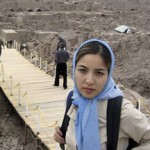Latest Post: Roxana Saberi Update - Positive Signs Despite a Hopeless TV InterviewRelated Post: The Dangers of the Roxana Saberi Espionage Trial
Iranian-American journalist Roxana Saberi
has been convicted on charges of espionage and
jailed for eight years by an Iranian Revolutionary Court.
Ms Saberi's lawyer Abdolsamad Khorramshahi and her father confirmed that the sentence would be appealed. The sentence was confirmed inside Iran by the Iranian Students News Agency, and there is
a short item on the English-language website of Press TV.
The quick sentencing surprises me, as a judiciary spokesman indicated on Tuesday that it would be two to three weeks before the verdict was announced. It could be that judicial forces wanted to show "independence" from political pressure (ironic given that this is a politicised case) and moved quickly.
Alternatively, Iranian political elements --- reacting to perceived US pressure or raising the stakes, both in internal Iranian political manoeuvring and in US-Iranian relations --- pushed for a lengthy jail sentence.
No evidence was presented publicly to support Saberi's conviction. Thus it remains unclear why her initial crime --- the purchase of a bottle of wine --- escalted into charges of reporting without a license (especially as she had been filing stories over the last two years without that license) and then spying.
The reaction of the US Government should be watched very carefully. My suspicion is that American officials have been trying behind the scenes to strike a deal for Saberi's release (probably after conviction and deportation).
Secretary of State Hillary Clinton's response reinforces that suspicion, as she maintained the measured tone that she was "deeply disappointed". Her statement was limited to the case rather than the wider significance for US-Iranian relations: "We are working closely with the Swiss Protecting Presence to obtain details about the court's decision, and to ensure her well-being....[We will] continue to vigorously raise our concerns to the Iranian government."
So far, Washington has not publicly linked the Saberi case to its "engagement" with Tehran, apart from the letter handed to the Iranians at the end of March. Does the Obama Administration continue with this strategy or does it threaten a suspension of engagement because of today's news?
 Saturday, April 25, 2009 at 16:53
Saturday, April 25, 2009 at 16:53 
 Iranian-American journalist Roxana Saberi
Iranian-American journalist Roxana Saberi  UPDATE (14 April): The
UPDATE (14 April): The